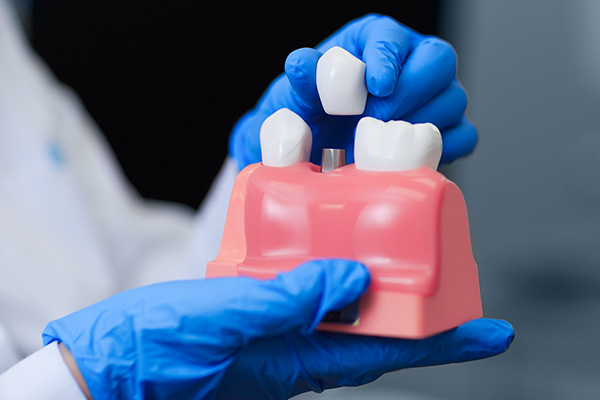 There are many routine dental procedures patients typically experience annually. The most common elements of dental checkups include X-rays and a cleaning. However, what happens if there is a problem with the gums? Even the most diligent patient may sometimes miss the early warning signs of gum disease. In this case, the dentist may perform further treatments that go beyond what is traditionally included in the scope of normal preventative care. Take a look at how dentists spot gum disease and some of the ways it is treated.
There are many routine dental procedures patients typically experience annually. The most common elements of dental checkups include X-rays and a cleaning. However, what happens if there is a problem with the gums? Even the most diligent patient may sometimes miss the early warning signs of gum disease. In this case, the dentist may perform further treatments that go beyond what is traditionally included in the scope of normal preventative care. Take a look at how dentists spot gum disease and some of the ways it is treated.
What is gum disease?
The gums are responsible for molding around teeth, covering the roots and ensuring that everything stays where it should. When bacteria penetrate the gums, it can compromise this tissue. Gingivitis is the common term dentists use to describe the precursor to gum disease. At this stage, the gums appear red and inflamed around the teeth. A dentist can usually help treat gingivitis through increased cleanings and office visits. Periodontitis is when the condition deteriorates. This is considered gum disease. Periodontal treatments with a practitioner who has a concentrated practice in this issue may be warranted.
What routine dental procedures treat gum disease?
Brushing, flossing and cleanings with a hygenist can help stop the progression of gingivitis to gum disease. However, in some instances, these routine procedures do not work and advanced treatment is necessary. People who go too long before getting treatment for gum disease may lose teeth if the tissue around them is compromised beyond repair. Some advanced treatments may be warranted depending on how the disease has developed.
Non-surgical treatment
Aside from usual tooth cleaning, dentists may step the cleanings up to help rid the gums of the bacteria infecting them. Scaling and planing is a method used to perform a much deeper cleaning of the mouth, with a concentration on the gum line and below it. The dental professional focuses on removing thicker layers of tartar and plaque from around and under the gum line. The dentist or hygenist may also then take the time to smooth out areas of the teeth that are pitted or uneven, either from bacterial intrusion or plaque and tartar build-up. This helps to discourage future bacterial growth in the grooves of these teeth.
Surgical intervention
Some cases of gum disease may require a more aggressive approach. Surgery is one option that some patients may consider, especially if the gums are in bad shape. According to WebMD, there are five common surgical procedures that can help restore the gums and fend off tooth loss:
- Bone graft
- Pocket/flap reduction
- Tissue regeneration
- Bone surgery
- Tissue grafts
All of these procedures generally include thorough cleanings under the gum lines and, in some cases, a transplanting of bone from one area to another.
Check out what others are saying about our dental services on Yelp: Routine Dental Procedures in Kennewick, WA.
Conclusion
Keeping gums healthy is a top priority of routine dental procedures. Dentists want to help patients ensure that the mouth is healthy enough to sustain the teeth for many years ahead.
Request an appointment or call Gledhill Dental at 509-800-8410 for an appointment in our Kennewick office.
Related Posts
Routine dental procedures typically refer to common procedures that general dentists perform in order to maintain or better their patients' oral health. There is a lot of information to know and have an understanding of when it comes to routine dental procedures. For example, having a clear idea of what is considered one can be…
A restorative dentist can help transform dental health and restore confidence in your smile. These dental professionals address a variety of dental issues, from missing teeth to damaged enamel. The goal of restorative dentistry is to improve both the function and appearance of your teeth, allowing you to achieve better oral health and renew your…
There are several dental implant options for replacing missing teeth. A dental implant permanently replaces a missing tooth, saving smiles and helping people eat their favorite foods for years to come. Unlike other options for replacing missing teeth, dental implants do not require regular check-ups from a dentist.The three most common types of dental implants…


